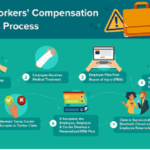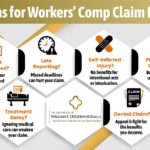Facing a work-related injury is tough enough. But when your workers’ compensation claim gets denied, it can feel like insult added to injury. If you’ve been left wondering what went wrong – and what to do now – you’re not alone. Let’s walk through why even common compensation claims get rejected and what smart next steps you can take to get back on track.
The Shocking Reality: Denials Are More Common Than You Think
Each year, thousands of injured workers have their claims denied, often for reasons that could’ve been avoided. The truth is, the workers’ comp system isn’t always friendly or transparent. In fact, according to the National Council on Compensation Insurance, up to 13% of claims are initially denied, but nearly half of them are eventually accepted after further review or appeal. That means your rejection isn’t the end of the road.
1. You Didn’t Report the Injury Soon Enough
Timing matters, and not just in comedy.
Workers’ compensation rules often require that injuries be reported within a specific timeframe, which can vary by state. If you delay reporting your injury to your employer, even by a few days, your claim could be at risk. The longer you wait, the more suspicious your claim may appear. Insurers may assume you weren’t really hurt or that the injury didn’t happen at work.
Fun fact: Some states give you as little as 24 hours to report an injury if you want full eligibility. That’s less time than most people take to process their weekend plans.
2. There’s No Official Medical Record
After a workplace injury, you might be tempted to “walk it off.” But without documentation from a licensed physician, you won’t have a leg to stand on – figuratively and possibly literally.
If you didn’t seek immediate medical care or didn’t follow up as instructed, insurers might argue that your injury wasn’t serious or that it never happened at all. Always make sure to keep records of every visit, treatment, and diagnosis.
3. Your Injury Doesn’t Seem Work-Related
This is one of the trickiest areas for claim approval. If the insurer or employer believes your injury happened outside of work hours, while commuting, or during a personal errand, your claim can be denied.
Let’s say you slipped on a wet floor at work – clear cut, right? But if you didn’t have witnesses or there was no surveillance footage, your employer might say you were horsing around or not on the clock yet. Context is everything.
4. Your Employer Disputes the Claim
Even if you do everything by the book, your employer may push back and argue that the injury didn’t happen the way you said it did. They might question the timeline, your behavior, or even your history at the company.
This doesn’t mean you’re doomed – it just means you need to build a solid case with strong documentation, possible witness statements, and legal support if needed.
5. Pre-Existing Conditions Cloud the Issue
Insurance companies love to latch onto pre-existing conditions to avoid paying out. If you had a bad back before starting your job, and you hurt it again while lifting boxes, your claim might be denied with the excuse that it was an “old injury.”
But the law generally protects aggravation of existing conditions – if work made it worse, you may still qualify. The challenge is in proving it.
What to Do Next: Turning a No Into a Yes
Getting denied is frustrating, but it’s not final. Here’s how to fight back with confidence:
Step 1: Request a Written Explanation
Always start by getting the denial letter and reading it closely. It should explain why your claim was rejected. This info is your roadmap for building a better case.
Step 2: Gather Stronger Evidence
This might include:
- Medical records from different doctors
- Statements from coworkers who witnessed the injury
- Time-stamped photos or video, if available
- Emails or text messages that support your timeline
Step 3: File an Appeal (And Don’t Delay)
Most states give you between 30 and 90 days to file an appeal. Missing this window can kill your chances completely. Consider talking to a workers’ compensation lawyer – Golden State Workers Compensation serving San Jose, CA is one option – many offer free consultations, and they only get paid if you win.
Step 4: Learn From the Process
Even if your first claim was denied, every piece of feedback you get makes your case stronger. Many people eventually succeed on appeal, especially if they correct the issues that led to the initial rejection.
Don’t Give Up Too Soon
It’s easy to feel defeated after a claim denial. But remember: you’re not just a number in a file – you’re a person who got hurt doing your job. And the system exists to protect you. With the right strategy, persistence, and guidance, you can still get the compensation and care you deserve.
Stay informed. Stay determined. And know that a “no” today doesn’t mean it’s the end of the line.
















